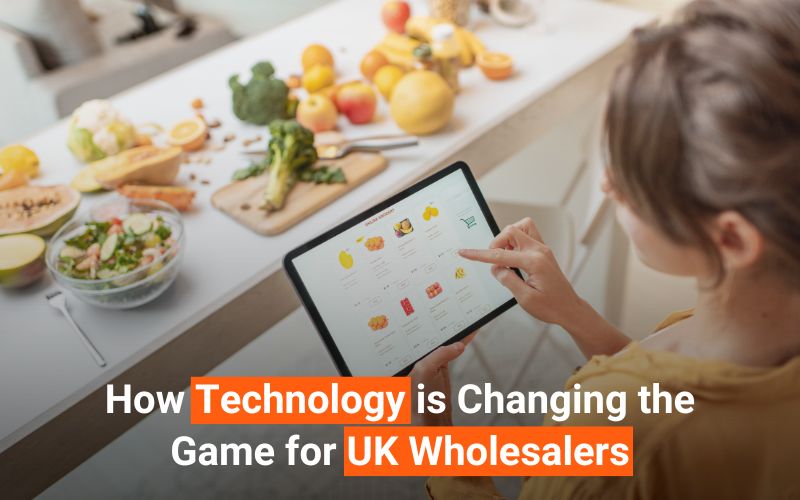The food retail industry is undergoing a major transformation as technology continues to play an increasingly important role in the way food is sourced, distributed, and consumed. In the UK, wholesalers are at the forefront of this transformation, leveraging the latest advancements in data analytics, automation, and artificial intelligence to optimize their operations, improve their customer experience, and stay ahead of the competition. In this article, we’ll explore the future of food retail and how technology is changing the game for UK wholesalers.
What is a Food Retail Industry?
The food retail industry includes all businesses involved in the sale and distribution of food products to consumers. This includes supermarkets, grocery stores, convenience stores, online retailers, and wholesalers that supply food to these businesses. The industry encompasses a wide range of products, from fresh produce and meat to packaged goods and ready-to-eat meals. The food retail industry is a major contributor to the global economy, and it plays an important role in providing consumers with access to safe, nutritious, and affordable food.
The Future of the Food Retail Wholesalers in the UK:
The future of food retail is being shaped by a number of trends and innovations, many of which are driven by advances in technology. Overall, the future of food retail is likely to be driven by a combination of technology, changing consumer preferences, and a growing focus on health and sustainability. Retailers that are able to adapt to these trends and innovate accordingly are likely to thrive in the years ahead. Top of Form
Here is little detail of the key trends that are likely to shape the future of food retail wholesalers in UK:
1. Online Ordering and Delivery:
The rise of e-commerce has transformed the food retail industry, making it easier than ever for consumers to order groceries online and have them delivered directly to their doorstep. This trend is likely to continue, with more retailers investing in online ordering and delivery services to meet the growing demand for convenience.
2. Personalization:
Consumers are increasingly looking for personalized food products and experiences, and retailers are responding by offering customized products and services. For example, retailers are using data analytics and AI to recommend products based on consumers’ preferences and purchase history.
3. Health and Sustainability:
Consumers are becoming more health-conscious and environmentally aware, and retailers are responding by offering healthier and more sustainable food options. This includes products made from plant-based ingredients, as well as products that are locally sourced and produced using sustainable farming practices.
4. Data Analytics
One of the biggest trends in food retail is the use of data analytics to gain insights into customer behaviour, preferences, and trends. Wholesalers are now able to collect and analyse large amounts of data from various sources, including point-of-sale systems, social media, and customer loyalty programs. By using data analytics tools, wholesalers can identify buying patterns and trends, and tailor their offerings to meet the needs of their customers. For example, if data shows that customers are buying more vegan products, wholesalers can adjust their inventory accordingly.
5. Automation
Automation is another trend that is transforming the food retail industry. Wholesalers are using automated systems to streamline their operations, reduce costs, and improve efficiency. For example, automated warehouses can process orders faster and more accurately than human workers, reducing the risk of errors and delays. Similarly, automated delivery systems can optimize routes and schedules, reducing fuel consumption and improving delivery times. With the rise of e-commerce, automation has become even more important for wholesalers, who need to fulfil a growing number of online orders.
6. Artificial Intelligence
Artificial intelligence (AI) is also playing an increasingly important role in food retail. Wholesalers are using AI-powered tools to improve their supply chain management, reduce waste, and optimize pricing. For example, AI algorithms can analyse sales data and other factors to predict demand and adjust pricing accordingly. AI can also be used to optimize inventory management, ensuring that wholesalers have the right products in stock at the right time.
7. Mobile Apps:
Mobile apps have become increasingly popular for wholesalers, as they allow for easy ordering and inventory management on the go. Wholesalers can use mobile apps to access real-time inventory data, create new orders, and manage customer accounts.
8. Cloud Computing:
Cloud computing has made it easier for wholesalers to store and access data from anywhere, as well as collaborate with partners and customers in real-time. Cloud-based systems are also scalable, meaning wholesalers can adjust their computing power and storage as their business grows.
Impact on the Industry
The adoption of these technologies is having a significant impact on the food retail industry. Wholesalers that are able to leverage these advancements are gaining a competitive edge, as they are able to offer better products, faster delivery times, and more personalized experiences to their customers. They are also able to reduce costs, increase efficiency, and improve their sustainability by reducing waste and optimizing their operations.
However, the adoption of technology is not without its challenges. Wholesalers need to invest in the right tools and infrastructure, and they need to ensure that their staff are properly trained to use them. They also need to ensure that their systems are secure and that they are complying with data protection regulations.
Read More: Best Cat Food to Stock at your Retail Store in UK
Conclusion
The future of food retail is being shaped by technology, and UK Wholesalers are at the forefront of this transformation. By leveraging data analytics, automation, and artificial intelligence, wholesalers are able to optimize their operations, improve their customer experience, and stay ahead of the competition. As technology continues to evolve, it will be interesting to see how wholesalers adapt and continue to innovate to meet the changing needs of their customers.
Overall, technology has transformed the wholesale industry in the UK, making it more efficient, accurate, and customer-focused. With the continued development of new technologies, it’s likely that the game will continue to change for wholesalers in the coming years.





